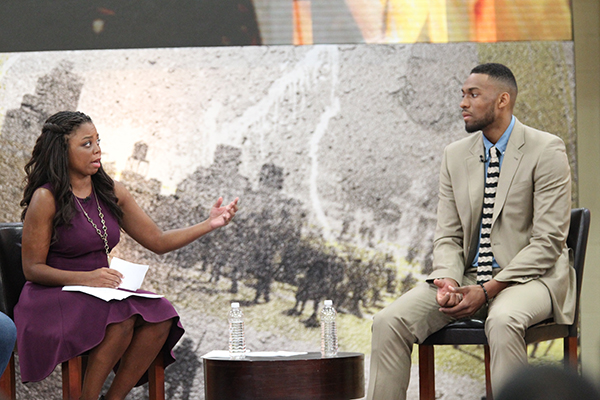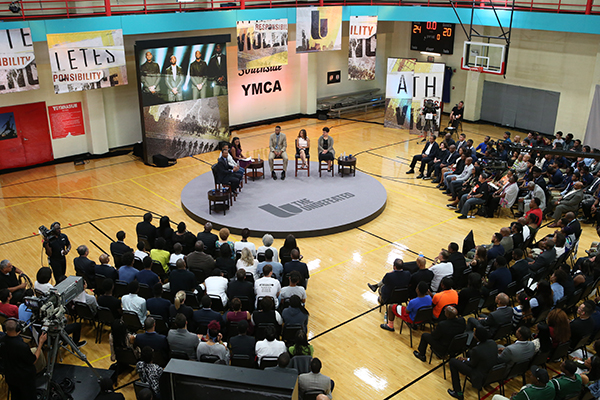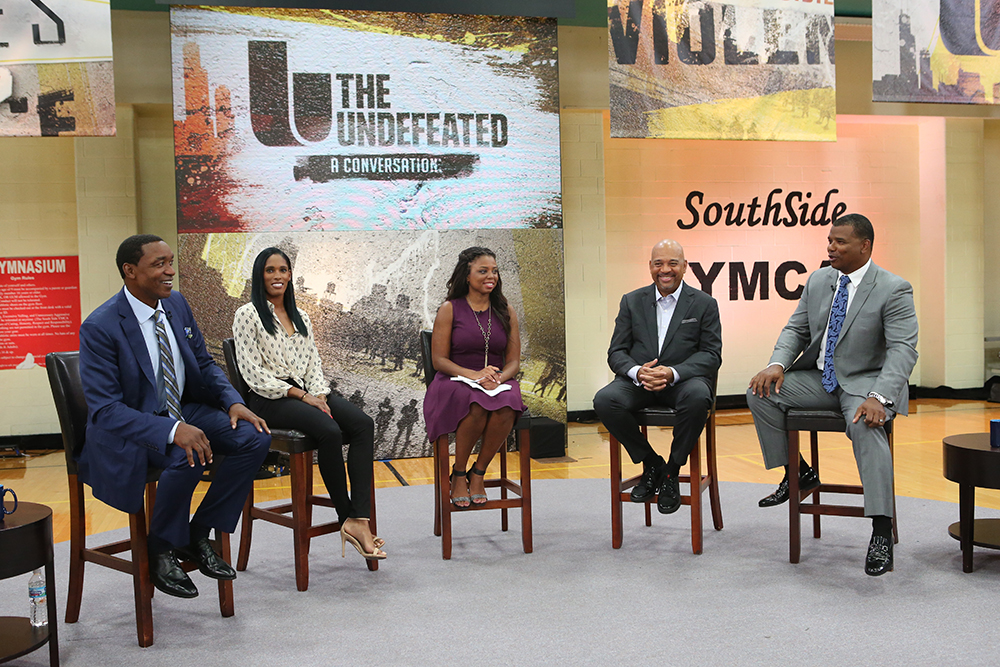Since its launch this May, The Undefeated, an ESPN website focusing on sports and the nuances of the African-American experience, has done a good job starting conversations around the intersection of sports, race, and culture.
The site took it a step further this week, hosting the "Athletes, Responsibility and Violence" town hall at the South Side YMCA in Woodlawn and bringing a slate of athletes, experts, and community members together for the televised special. Though at times oversimplistic, it was an important foray into a conversation that for too long has been missing from mainstream sports coverage.
Even though Chicago, which doesn’t have a shortage of stories about heart-breaking violence, was used as backdrop, the conversation focused on larger national issues: racial profiling, gun violence, and activism.
Among the headliners were Milwaukee Bucks player Jabari Parker, who recently wrote an essay about growing up amid gun violence in Chicago, Chicago Sky player Cappie Pondexter, and Kristi Castlin, Olympic medalist in track and field. But the standout moments were from everyday Chicagoans.
After an opening montage featuring Chicago activist Malcolm London (who performed spoken word poetry throughout the event), an eight-year-old boy named Mehki Butler recounted a time that he was on the playground when gun violence erupted. He spoke briefly about his experiences living in his community.
Butler’s words were a sobering reminder that the city’s playgrounds and basketball courts are no longer the safe spaces they used to be. When I was growing up in South Shore in the '80s and '90s, these places were considered off-limits to gangs. That change became all too clear in last year's murder of Tyshawn Lee, who was taken from an Auburn Gresham basketball court and fatally shot in an alley across the street from the park.
Another black Chicagoan, retired police officer Marco Johnson, offered a unique perspective about crime in black neighborhoods and police-community relations. Though these conversations often revolve around how black people ought to work more with the police, Johnson pointed out that officers don’t get out of their squad cars to talk to kids like he used to.
Johnson, who now runs the Englewood Police/Youth Baseball League, in which many of the coaches are police officers, was on the force for 28 years. He broke down on the verge of tears when discussing the death of Arshell Dennis III, the son of Officer Arshell "Chico" Dennis, a close friend of his. He asked, “When are we going to stop killing each other?”
One of the more interesting exchanges (or rather, non-exchange) during the discussion was when moderator Jemele Hill asked White Sox Vice President Ken Williams about the lack of white athletes speaking up on social issues. Williams, who is black, sidestepped the question.
The question was a fair one, considering we’ve seen the likes of Derrick Rose and Joakim Noah speak up, but not Kris Bryant, Chris Sale, Jay Cutler, or Jonathan Toews.

Newly signed Bulls guard and Chicago native Dwyane Wade seems to be following Rose and Noah's footsteps, as he pre-recorded an interview that was aired at the town hall. He spoke about "the talk" he has given his sons on how to deal with police officers, for fear of being shot due to their race. It's a conversation that's happened in the homes of black people for decades.
“The problem goes back to the Great Migration. We adopted that mentality of, ‘it’s about me surviving,’" he said in the segment. “And we’re still like that today.”
A separate discussion about whether athletes should get involved in activism garnered a memorable response from Jabari Parker. Parker told the crowd assembled that even though he had gotten used to the violence in the city, he was compelled to speak out on social issues.
"I believe in my neighborhood. I believe in my people,” Parker said. “I believe in my environment. That’s a risk you have to take.”
Overall, I enjoyed the panel discussion. ESPN and The Undefeated did a great job in discussing issues that are important to their audience. But the focus on what community members could do to stop “black-on-black crime” sometimes resembled the political football thrown around by the Republican Party in the current election cycle.
Personal responsibility is always mentioned in these discussions, but I would’ve liked to have seen more nuanced discussion around systemic issues. Football analyst Marcellus Wiley, activist Dawn Valenti, and UIC professor Elizabeth Todd-Breland broached the subject a few times, though only briefly.
After all, you can’t just talk about crime in a vacuum while only vaguely mentioning the important mitigating factors. Many of the people who live in the affected neighborhoods believe that elected officials and police have left them to fend for themselves.
We’re well aware of the record-setting pace of murders due to gun violence in Chicago. A discussion of topics such as segregation, redlining, food deserts, the lack of TIF funds for black and Latino neighborhoods, along with the fallout from closing public schools in those areas, would have made for a better, albeit harder, discussion.
Sometimes, a venture outside the comfort zone is needed to address what many Americans, particularly Chicagoans, have grown too comfortable with.





